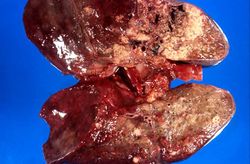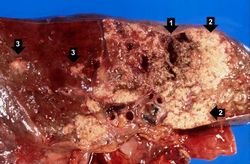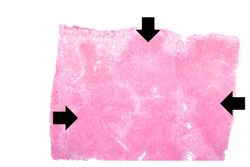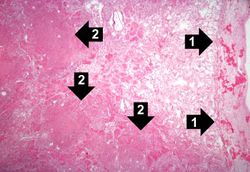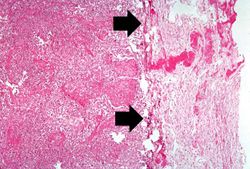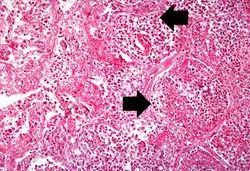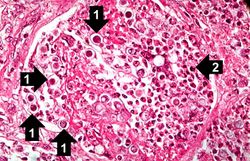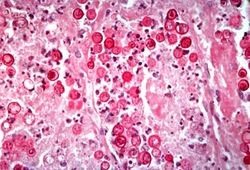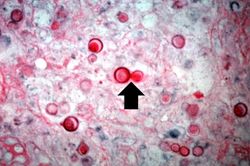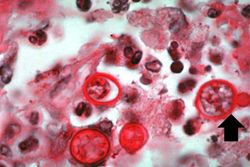Difference between revisions of "IPLab:Lab 10:Blastomycosis"
| Line 20: | Line 20: | ||
File:IPLab10Blasto10.jpg|This is a very high-power photomicrograph showing Blastomyces organisms stained with PAS. Note the budding organism (arrow) and the underlying pyogranulomatous inflammatory reaction in the background. | File:IPLab10Blasto10.jpg|This is a very high-power photomicrograph showing Blastomyces organisms stained with PAS. Note the budding organism (arrow) and the underlying pyogranulomatous inflammatory reaction in the background. | ||
</gallery> | </gallery> | ||
| + | |||
| + | == Study Questions == | ||
| + | * <spoiler text="What is the route of infection of Blastomyces?">Blastomyces is acquired by inhalation of infectious spores from the soil.</spoiler> | ||
| + | * <spoiler text="Blastomyces has a restricted geographical distribution in the US. What regions are endemic?">In the United States, infection is usually limited to areas along the Mississippi, Ohio, and St. Lawrence Rivers, and along the Great Lakes.</spoiler> | ||
| + | * <spoiler text="What groups of people are at increased risk for Blastomyces?">Those exposed to dust--construction workers exposed to dust from construction sites, hunters and outdoors people who walk in dusty areas, and farm workers.</spoiler> | ||
| + | * <spoiler text="What is the usual clinical manifestation of Blastomyces infection?">Most patients get a pyogranulomatous pneumonia. However, Blastomyces can spread outside the lungs to the skin, bones, and prostate.</spoiler> | ||
{{IPLab 10}} | {{IPLab 10}} | ||
[[Category: IPLab:Lab 10]] | [[Category: IPLab:Lab 10]] | ||
Revision as of 16:13, 21 August 2013
Clinical Summary[edit]
About three weeks before his death, this 17-year-old white male developed a "chest cold" which gradually worsened. The patient was eventually admitted three days before his death. At that time, the patient was very dyspneic. Chest x-ray showed consolidation of the entire left lung. The initial impression by his care team was staphylococcal pneumonia. However, Blastomyces dermatitides was identified in stained smears of sputum the next day. In spite of appropriate antifungal therapy, the patient deteriorated rapidly and died.
Autopsy Findings[edit]
Autopsy confirmed that the entire left lung was semi-solid.
Images[edit]
This high-power photomicrograph shows an alveolus filled with numerous round bodies up to 25 mm in diameter. Some of these double-contour bodies (1) have a dense center and a clear halo. These are the Blastomyces organisms. The typical B. dermatitides organism is smoothly-outlined with a central, densely basophilic cytoplasm surrounded by a clear halo. When stained with hematoxylin and eosin, the organism is outlined by a relatively thick cell wall. There are also numerous inflammatory cells (2) in the alveolus--neutrophils, lymphocytes and macrophages--which produce a pyogranulomatous inflammatory reaction.
Study Questions[edit]
| |||||
In alcoholics, aspiration pneumonia is common--bacteria enter the lung via aspiration of gastric contents.
